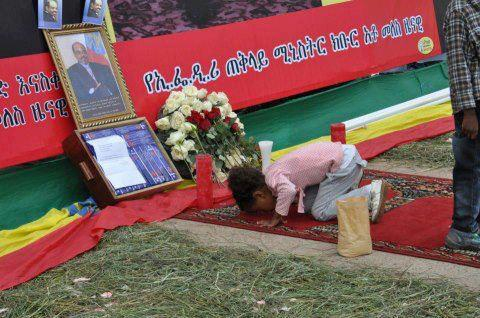Farewell and Farce-well to a Dictator
by Mesfin Negash / September 7, 2012 / No comments
As Meles Zenawi is buried, an entire country is influenced to mourn.
Meles Zenawi, the person who ruled Ethiopia for twenty-one years has died. Now Ethiopia is trying to reconcile his simultaneous absence and presence. His absence is obvious because we no longer hear his diatribes, lectures, derogatory bravado, insults, and rare humors. However, Zenawi is still present in Ethiopia in his controversial economic achievements and the brutal government machine that he masterminded.

- Why does a country with her own unique alphabet and long history of writing persist to deny citizens the right to freedom of expression in this era of Expression? No other country in Africa may typify this paradox more than Ethiopia. As Leopold Senghor’s famous collection of poems entitled “Ethiopiques” remained ‘powerful and popula’ so does the source of his intriguing title, Ethiopia, in her own ways. In “Ethiopiques,” I share Ethiopian views on pertinent issues related to journalism, culture and, of course, the overarching subject of politics.

- Mesfin Negash is an Ethiopian journalist living in exile in Sweden. He is one of the journalists accused of “terrorism” in 2011 by the Ethiopian government. The co-founder and first editor-in-chief of an acclaimed Ethiopian newspaper, Addis Neger, he is currently the Managing Editor of Addisnegeronline.com. He is a political science student by training and known for his critical commentaries on significant political and social issues.
The politics of remembering and forgetting is one source of controversy in every society. The controversy deepens when a powerful, divisive figure is involved. In societies where the public is free to express their views, people in power can influence but cannot control the entire narrative. Exceptions are abundant such as in North Korea or Ethiopia. In these countries one will find a kind of national state-sponsored grief, manufactured to mourn the death of a Dear Leader.
PM Meles Zenawi’s death, or arguably the official announcement of it, is gripping the nation in a most unexpected way. Ethiopians are witnessing epic national “mourning” and depiction of a manufactured grief. The world was flabbergasted to see North Koreans mourn the death of their Dear Leader in such a dramatic fashion, and the mourning was not about the death of a human being but that of a god-like figure. What we have witnessed in Ethiopia is the African version. A funeral of this type involves creating a myth, sometimes based on true stories, that amplifies the deeds, knowledge, skills, and wisdom of the deceased. The official memory doesn’t count a single weakness or wrong of the deceased. A semblance of public approval of this myth is instilled by a national “grief” created by a state propaganda machine. However what is on display in Ethiopia is an extreme form of official and televised grief fabrication. Such a display and its intent tell much about the system the late leader left behind as well as those taking his place. Indeed, I can hardly say a mature debate on the late PM has started in earnest. No one side looks ready to reflect on or learn from his legacy.
Meles’s economic achievements and his position as the country’s leader could have been satisfactory consolations for many had they not been shattered by the grief campaign that followed his death. Furthermore, while he was alive the late PM made sure that no politically sensitive event was allowed to be televised. The irony of this is that nothing is more politically significant and sensitive than his own death, which has been televised extensively.
The drama of Ethiopia’s “grief” has taken many turns since August 20th when Meles Zenawi’s death was officially declared. Initially we saw his wife, family, and colleagues weeping on television. But from there one cannot see where the private mourning ended and the public mourning started. This confusion seems intentional. I would assume that many who weep are crying with the family for humane and cultural reasons, rather than political ones.
At the climax of the media coverage, a homeless man in Addis Ababa told a reporter that he lived on the street because he trusted the late PM’s providence. (Most street children and homeless poor live by begging.) Then hospitalized patients, some in wheelchairs or using crutches, were forced to go to the national palace to pay tribute to the late PM. The patients in their hospital dresses were portrayed on TV as having a big adventure. Government employees were also ordered to pay tribute to the PM, and citizens in every part of the country were told to attend extended memorial services, or face the consequences. Businesses like music shops, bars, cafés, and hair salons were told not to play music that reflected any kind of joy, and government offices all over the country stopped their work for two weeks. The list goes on from there. Even mentioning the PM’s downsides has been depicted as “immoral” or “un-Ethiopian” by ardent supporters in every possible public platform, including social media.
These events remind me of Václav Havel’s green grocer from “The Power of the Powerless.” In that piece Havel wrote,“I think it can safely be assumed that the overwhelming majority of shopkeepers never think about the slogans they put in their windows, nor do they use them to express their real opinions.”
But I won’t blame the late certified dictator Meles Zenawi for this over exaggerated grief propaganda. He is gone. It is the system he created and the people he gathered around him that are orchestrating this humiliating and dehumanizing act of grief management. Ironically, this will take me back to him, the only one who created, sustained, and led the system.
The body of the PM was laid to rest on September 2nd. The government announced that a mausoleum will be build in memory of Meles Zenawi. In the process Ethiopia has outdone North Korea in creating a false sense of national grief. The farewell that started with a genuine state funeral ended as a farce-well. Will this idolization continue in the construction of huge monuments, endowing the man with an eternal status of some kind? The party propaganda machine will continue fabricating “truth,” history will write a better balanced picture.
Nevertheless, as a fellow human being, I noted my condolences to his family, friends and admirers whose grief is not part of the state propaganda.





